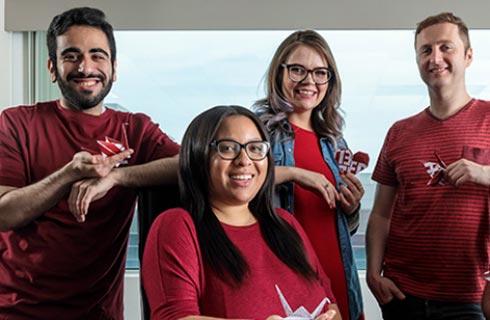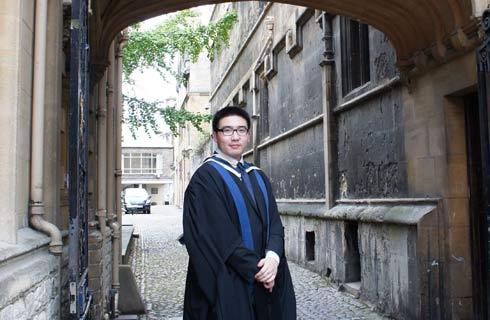临床验光硕士
Master of Clinical Optometry

学历文凭
Masters Degree (Coursework)

专业院系
Faculty of Science

开学时间

课程时长

课程学费

国际学生入学条件
Direct pathway: Entry into the double award 3182 Bachelor of Vision Science/Master of Clinical Optometry program.
You must maintain an overall CREDIT average (65%) at the end of the Bachelor of Vision Science component of the program to progress to the Master of Clinical Optometry. Students who do not meet this requirement are expected to exit the program with a Bachelor of Vision Science degree.
IDP—雅思考试联合主办方

雅思考试总分
- 雅思总分:
- 托福网考总分:
- 托福笔试总分:
- 其他语言考试:
CRICOS代码: 093022B
申请截止日期: 请与IDP联系 以获取详细信息。
课程简介
We rely heavily on our five senses to navigate life: touch, taste, smell, hearing and sight. Each of these senses play a vital role in our day-to-day lives. Problems with eyesight can have a profound impact on an individual’s life. Through optometry, many vision problems and eye diseases can be corrected or managed, restoring sight to people from all walks of life. Optometrists diagnose vision problems, eye diseases and other eye health issues. These highly skilled professionals correct poor vision and manage or slow degenerative eye diseases with corrective lenses, optical aids, therapy or medication. The Master of Clinical Optometry is a two-year degree that serves as a pathway to registered practice as an optometrist in Australia, New Zealand and parts of Asia. It combines the theoretical discipline of vision science, the optics of lenses and instruments, the physiology of the eye, the psychophysics of vision and neuroscience with the clinical art of primary eye care, which covers the diagnosis and management of ocular disease, the dispensing of spectacles and contact lenses, the management of people with special needs (children, low vision), sports vision and vision in the workplace.
相关申请
 预科
预科 奖学金
奖学金 实习机会
实习机会 在校学习
在校学习 跨境学习
跨境学习 校园授课-线上开始
校园授课-线上开始 在线/远程学习
在线/远程学习
开学时间&学费
学费信息仅供参考,请与IDP联系以获取详细信息
| 开学时间 | 时长 | 学费 | 地点 |
|---|
学校排名

世界排名71
数据源:
泰晤士高等教育世界大学排名
关于悉尼新南威尔士大学

新南威尔士大学悉尼校区(UNSW Sydney)是一所全球排名前 20 的大学,致力于通过教育和研究推动进步,造福每一个人。UNSW帮助未来的领导者充分释放潜能,将他们的技能和热情投入到具有影响力的事业中。UNSW是澳大利亚就业成果排名第一的大学,工作一体化学习是其就业就绪方法的重要组成部分。UNSW 悉尼校区连续第五年在 "2024 百强未来领袖奖"评选中被评为 "澳大利亚最具就业能力大学"。UNSW 有 37 名学生被评为就业能力最强的学生,在所有大学中名列前茅。UNSW 毕业生的全职就业率和薪酬在悉尼各大学中名列前茅。根据《泰晤士报》高等教育影响力排名,UNSW 在气候行动方面排名世界第二位 ,总体排名第七。UNSW大学在研究领域处于世界领先地位,是不平等和气候变化等关键领域跨学科研究的先驱。UNSW在太阳能和量子计算等关键发展领域处于领先地位。在澳大利亚成功应对新冠疫情的过程中,UNSW 的全球知名学者站在了第一线。UNSW的研究质量和影响力在澳大利亚排名第一。UNSW有100多个研究中心和7个顶尖学院,其研究成果改变了全世界的生活。UNSW在推动关键领域的突破、将想法转化为行动以促进全民进步方面享有全球声誉。新南威尔士大学在悉尼有多个校区。在''2025年QS最佳求学城市''中,悉尼被评为最适合国际学生留学的城市之一。
本校相关课程

视觉科学哲学博士(通过研究)-视觉科学
学历文凭
Ph.D.
开学日期
课程费用总额


气候科学哲学博士(研究)
学历文凭
Ph.D.
开学日期
课程费用总额


心理科学学士
学历文凭
Bachelor Degree
开学日期
课程费用总额


化学哲学博士(研究部)-化学
学历文凭
Ph.D.
开学日期
课程费用总额


商科学士/理学学士(高级数学)(荣誉学位)
学历文凭
Dual Degree
开学日期
课程费用总额


信息系统学士-信息系统
学历文凭
Bachelor Degree
开学日期
课程费用总额

其他相关课程

MPhil Optometry and Vision Sciences
 安格利亚鲁斯金大学
安格利亚鲁斯金大学学历文凭
Masters Degree (Research)
开学日期
课程费用总额


PhD Optometry and Vision Sciences
 安格利亚鲁斯金大学
安格利亚鲁斯金大学学历文凭
Ph.D.
开学日期
课程费用总额


Graduate Diploma in Optometry
 阿斯顿大学
阿斯顿大学学历文凭
Graduate Diploma
开学日期
课程费用总额


验光大师
 赫特福德大学
赫特福德大学泰晤士高等教育世界大学排名:765
学历文凭
Undergraduate Masters
开学日期
课程费用总额


学士学位(荣誉)理学士学位
 卡迪夫大学
卡迪夫大学泰晤士高等教育世界大学排名:204
学历文凭
Bachelor Degree
开学日期
课程费用总额


Undergraduate Pathway in Optics (Cambridge Ruskin International College)
 纳维教育
纳维教育学历文凭
Foundation for Undergraduate
开学日期
课程费用总额










 澳大利亚
澳大利亚